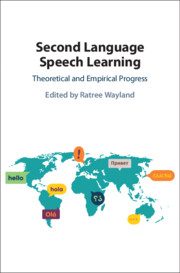Book contents
- Second Language Speech Learning
- Second Language Speech Learning
- Copyright page
- Dedication
- Contents
- Figures
- Tables
- Contributors
- Preface
- Acknowledgments
- Part I Theoretical Progress
- Part II Segmental Acquisition
- Part III Acquiring Suprasegmental Features
- Part IV Accentedness and Acoustic Features
- Part V Cognitive and Psychological Variables
- Chapter 16 Self-Reported Effort of Listening to Nonnative Accented English Depends on Talker Pausing and Listener Working Memory Capacity
- Chapter 17 Investigating the Role of Cognitive Abilities in Phonetic Learning of Foreign Consonants and Lexical Tones
- Chapter 18 Auditory Priming Effects on the Pronunciation of Second Language Speech Sounds
- Chapter 19 Indexical Effects in Cross-Language Speech Perception
- Chapter 20 The Role of Orienting Attention during Perceptual Training in Learning Nonnative Tones and Consonants
- Index
- References
Chapter 17 - Investigating the Role of Cognitive Abilities in Phonetic Learning of Foreign Consonants and Lexical Tones
from Part V - Cognitive and Psychological Variables
Published online by Cambridge University Press: 21 January 2021
- Second Language Speech Learning
- Second Language Speech Learning
- Copyright page
- Dedication
- Contents
- Figures
- Tables
- Contributors
- Preface
- Acknowledgments
- Part I Theoretical Progress
- Part II Segmental Acquisition
- Part III Acquiring Suprasegmental Features
- Part IV Accentedness and Acoustic Features
- Part V Cognitive and Psychological Variables
- Chapter 16 Self-Reported Effort of Listening to Nonnative Accented English Depends on Talker Pausing and Listener Working Memory Capacity
- Chapter 17 Investigating the Role of Cognitive Abilities in Phonetic Learning of Foreign Consonants and Lexical Tones
- Chapter 18 Auditory Priming Effects on the Pronunciation of Second Language Speech Sounds
- Chapter 19 Indexical Effects in Cross-Language Speech Perception
- Chapter 20 The Role of Orienting Attention during Perceptual Training in Learning Nonnative Tones and Consonants
- Index
- References
Summary
The goal of this study was to examine the role of cognitive abilities in implicit learning of two types of contrasts — lexical tone contrasts and coronal consonant contrasts. Twenty-four adult native English speakers naïve to Vietnamese were asked to learn the names of twelve funny monsters, that is monosyllabic words differing in tones and initial consonants. After a word-identification training with feedback, learning was assessed using a 12-word alternative test and an auditory discrimination test. In addition, participants completed six tests of cognitive abilities involving episodic memory, working memory, executive function and attention, processing speed, and vocabulary (NIH & Northwestern University, 2006-2012). For both identification and discrimination, the proportion of tone errors was significantly larger than the proportion of consonant errors, but cognitive measures did not predict the occurrence of tone versus consonant errors. Processing speed and executive function and attention scores were significantly correlated with response accuracies in both tests. These results suggest that for beginning learners, individual differences in some cognitive abilities related to the fluid cognition complex correlate with implicit learning of phonetic categories of different types. However, working memory, arguably the most studied factor, appears not to matter in this learning scenario.
Information
- Type
- Chapter
- Information
- Second Language Speech LearningTheoretical and Empirical Progress, pp. 418 - 438Publisher: Cambridge University PressPrint publication year: 2021
